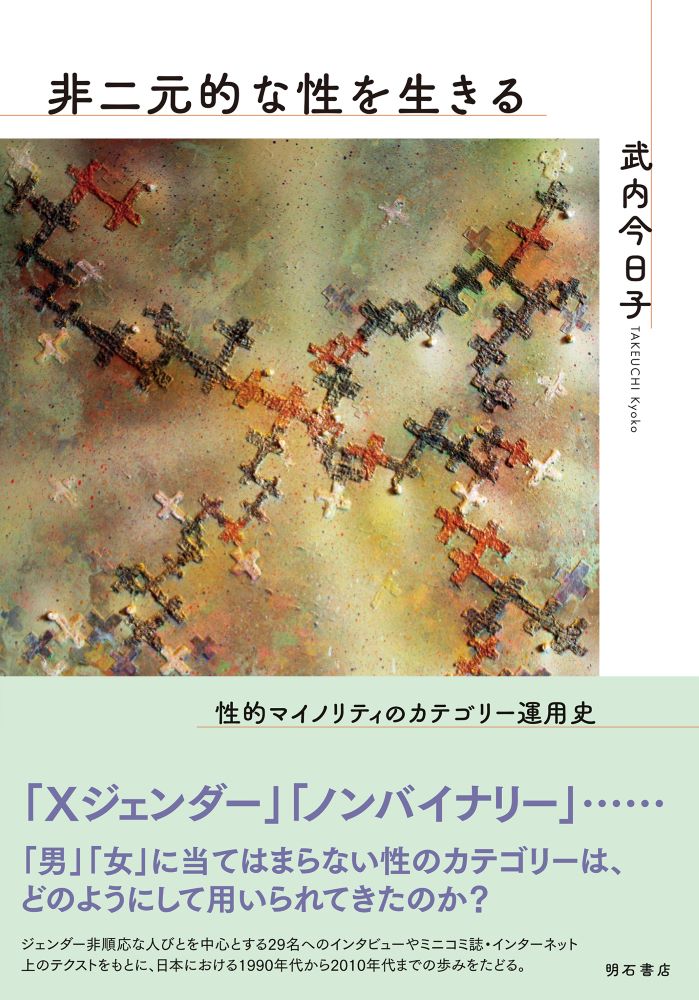
Title
Hi-nigen-teki na sei o ikiru A History of Sexual / Gender Minority Categories in Japan
Size
360 pages, A5 format
Language
Japanese
Released
March 20, 2025
ISBN
9784750359120
Published by
Akashi Shoten
Book Info
See Book Availability at Library
Japanese Page
Non-binary gender identities such as X-jendā and non-bainarī, which do not fit within the binary male–female framework, have become more widely recognized in recent years. However, when we try to trace the history of these categories, we find that information is surprisingly scarce, especially regarding the period before the late 2010s when the term non-bainarī began to gain mainstream visibility.
This book explores the history of non-binary gender categories and their use in Japan since the 1990s, drawing on a variety of texts including zines related to sexual/gender minorities, online materials, and interview data. Rather than examining non-binary gender solely in relation to gender binarism or prevailing norms, this book carefully documents the contexts in which these categories were employed and what people did through them.
Accordingly, this book traces various concepts and the communities in which they were used, such as toransu-jendā, sei dōitsusei shōgai, intā-jendā, chūsei, musei, futeisei, FtX, MtX, X-jendā, and non-bainarī. Yet, this history does not show a straightforward progression of terms. For instance, the now largely forgotten term intā-jendā appeared briefly in the late 1990s, only to re-emerge in a different context on personal websites and anonymous online forums. Even the term X-jendā has been used in various, often inconsistent ways, depending on the setting. Furthermore, some contexts show continuity, whereas others reflect discontinuity and redefinition. By focusing on this layered and shifting process of meaning-making, we can more closely understand what it means for individuals to position themselves within these categories and how such identification shapes their experiences.
The subtitle emphasizes that the book is not only about the history of non-binary gender but also a broader history of how categories related to sexual/gender minorities have been used. People living non-binary lives often find themselves situated—sometimes uneasily—within lesbian, gay, or bisexual communities. Moreover, sexual/gender minority categories are organized conceptually and have directly influenced how non-binary identities are positioned. The book will be relevant not only to those interested in non-binary identities, but also to anyone curious about how loosely defined categories are used in practice.
Finally, the book’s attempt to trace even the faintest historical records was made possible through the efforts of many collaborators. I hope that the complex journey of those who question mainstream gender concepts, struggle with the feeling of having no place to belong, and move back and forth between spaces of activism will become more widely known. Although the book focuses on the use of categories, the index includes the names of several collaborators, making it possible to trace how certain categories were positioned and how individual activities evolved over a lifetime. According to one collaborator, this book is “a precious record that will allow many people to look back and locate their own trajectories.” Some readers may have gone through the same spaces, whereas others may have crossed those paths only briefly. I hope this book offers readers a chance to connect with the histories of non-bainarī lives and reflect on the self, as well as on a society structured around binary norms.
(Written by: TAKEUCHI Kyoko / September 08, 2025)
Related Info
The 5th UTokyo Jiritsu Award for Early Career Academics (The University of Tokyo 2024)
https://www.u-tokyo.ac.jp/ja/research/systems-data/n03_kankojosei.html
Interview:
Interview with Kyoko Takeuchi (SETO Masaki | YouTube June 10, 2025)
https://www.youtube.com/watch?v=BMb_8eOobtI
Essay:
TAKEUCHI Kyoko “To continue to be a ‘researcher'” (SGRA – ATSUMI International Foundation Sekiguchi Global Research Association Nov 3rd, 2023)
https://www.aisf.or.jp/sgra/english/2023/11/30/takeuchi-kyoko-to-continue-to-be-a-researcher/
Event:
History of Nonbinary Gender Identities in Japan (Guest: Kyoko Takeuchi, author of _Living Nonbinary: A History of the Categorization of Gender/Sexual Minorities_) (ProgrezTribe June 15th, 2025)
https://progreztribe20250615.peatix.com/




 eBook
eBook